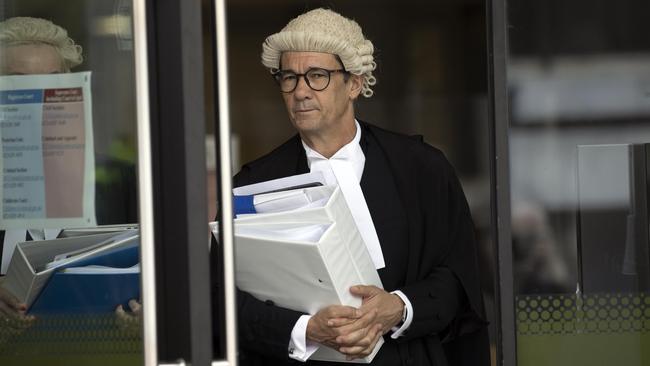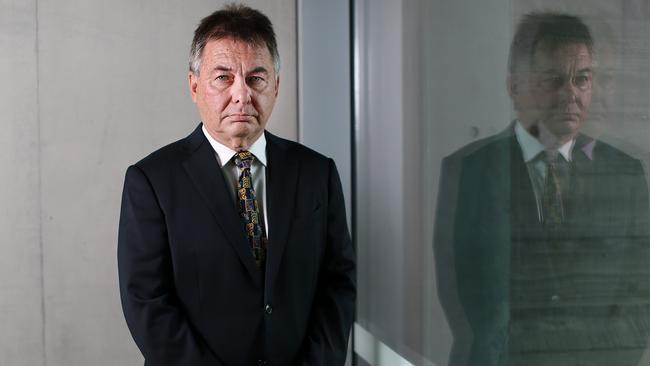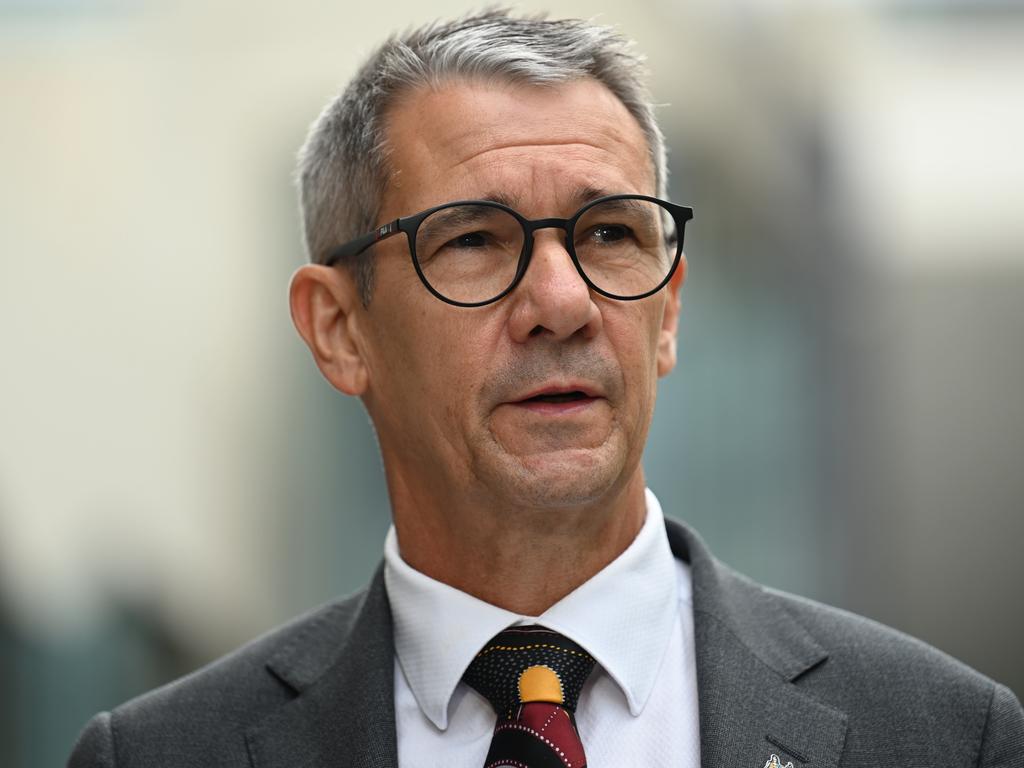Why would Shane Drumgold, at the peak of the legal world, behave so badly?
I am prepared to believe Shane Drumgold thought he was serving a higher good. But this is not solely an ACT issue. We need a national Sofronoff-style inquiry.

It is hard to comprehend why someone in that esteemed position could possibly think it was acceptable to try to conceal crucial evidence from the defence and, in doing so, lie not once but several times to a court, make numerous allegations he knew to be baseless, throw his staff and colleagues under the bus, and in critical respects ignore the protocols and etiquette of his profession?
Only Drumgold and his God will ever know the real reasons, of course. I am prepared to accept Drumgold did not believe he was behaving badly. In fact, I am prepared to believe Drumgold thought he was serving a higher good. It is quite possible that many in the media, and in the #MeToo movement, would have made the same choices as Drumgold in the belief that there are times when noble ends justify foul means.
Perhaps most frightening is that, even after the Sofronoff report, there are no doubt quite a few who still think Drumgold made the right choices when trying to withhold evidence from the defence. The deafening silence in response to the Sofronoff report from some political and media quarters – starting with the ABC, which appears more concerned about how this important report was leaked – tells you they regard this as an irritating glitch that will slow but not stop their campaign to right social wrongs by whatever means necessary.
For these people, more convictions for sexual assault and rape are an absolute necessity if we are to mitigate what is undoubtedly a historical evil. If, in pursuit of more convictions, the occasional innocent man goes to jail, so be it. You can’t make omelettes without breaking eggs. So, this reasoning goes, a little collateral damage to principles such as presumption of innocence, due process and natural justice and the traditional rules of evidence is an acceptable compromise in the big scheme of things.
While we all share the aim of eliminating or reducing sexual assault, a little knowledge of history tells you that being prepared to sacrifice the odd innocent person to do so is not a trade-off a civilised society can accept. It is trite but true to say the road to hell is paved with good intentions.
Drumgold should have remembered the words of the ACT Prosecution Policy, which Sofronoff quoted in his report, “that the purpose of a criminal prosecution is not to obtain a conviction; it is to lay before a court what the prosecution considers to be credible evidence relevant to what is alleged to be a crime”.
It is true that this public board of inquiry and the final report handed to ACT Chief Minister Andrew Barr this week came about accidentally in the sense that Drumgold demanded it without the slightest understanding of where it would end.
It is also true that the inquiry was a waste of time in the sense that, as Sofronoff pointed out, it was “not justified by any of (Drumgold’s) allegations”.
However, while undoubtedly a massive own goal by Drumgold, it could prove to be the most important inquiry and report in decades for the Australian criminal justice system. It shines a giant klieg light on a very dark corner of the criminal justice system. For that all Australians should be grateful to Sofronoff, counsel assisting Erin Longbottom KC, and the team of lawyers and other staff who produced a report that is thorough, lucid and confrontingly honest.
The lessons of the Sofronoff inquiry and report need to be applied at four levels. First, what does it mean for Drumgold? Second, what are the lessons, and the remedies, for the ACT criminal justice system? Third, what lessons does the ACT government need to learn? And finally, what does this mean for all Australians and our system of justice?
The implications for Drumgold are the easiest to deal with. As I wrote on Wednesday, there needs to be a serious examination of whether he was guilty of attempting to pervert the course of justice. Drumgold is entitled to the presumption of innocence as the state explores this important question given the findings of the Sofronoff inquiry. If former Federal Court judge Marcus Einfeld went to jail for two years for lying on a statutory declaration about a speeding offence, Drumgold may well be facing much more serious consequences.

The Sofronoff inquiry and report force us to ask some dire questions about the ACT criminal justice system. If the person at the apex of the powerful prosecution branch can behave like this there is a real question about systemic failure. How many people are in jail in the ACT because prosecutors withheld evidence from them? We do not know. That is an untenable stain of uncertainty for the ACT justice system.
As with the systemic failures caused by the Lawyer X scandal in Victoria and the DNA lab failures in Queensland, many cases may need to be reopened to see if a miscarriage of justice occurred. Prominent former judge Anthony Whealy KC acknowledged to The Australian that this would be very distressing for genuine victims of sexual assault “because there are genuine victims and that’s the problem – they have to stand by and see things rehashed, which must be traumatising for them. But if standards in the ACT have fallen this far, then I think a review of past cases, at least where (Drumgold) has been involved, is necessary.”
There are other aspects of the ACT legal system that need to be re-examined. For instance, Sofronoff acknowledged that “had the defence, by their professionalism and persistence, not obtained (the Moller report) despite the improper obstructions they faced”, a miscarriage of justice might have occurred.
But what of accused people who do not have the good fortune to have the talented and honourable Steve Whybrow SC and all Bruce Lehrmann’s team of skilled and dedicated lawyers in their corner? Remember that when Lehrmann initially sought help from ACT Legal Aid, he says he was told by a lawyer there that Legal Aid would not challenge a complainant’s account of the facts as a pack of lies – only that they were mistaken. One can only wonder if there are people sitting in ACT jails because Legal Aid would not defend them properly or because prosecutors withheld critical evidence.
Serious questions need to be asked of the ACT government, too. How did Drumgold get appointed to his role? Was he the best candidate? What kind of vetting took place? And this: does the ACT criminal justice system prioritise convictions over justice? Has the ACT government allowed the criminal justice system to be overrun by the most zealous members of the #MeToo movement? What other ideological obsessions of the ACT government infect the justice system?
Finally, we must acknowledge this is not solely an ACT issue. It is quite possible that all across the country zealous prosecutors are hitting targets for conviction rates by withholding evidence or playing other cute games with defence teams. Without an equivalent of a national Sofronoff inquiry, we can only point to anecdotal evidence of such abuses, but there is certainly plenty of that. Since I began reporting on this case, and on the Sofronoff inquiry, I have been deluged by barristers, solicitors, family and friends of alleged perpetrators of sexual offences with increasing numbers of anecdotal cases of apparent unfairness. Some I have investigated appear to have merit – these are for future articles. Some complaints seem baseless. There are enough of the former, however, to lead me to the conclusion that the pendulum of Australian justice may well have swung too far against alleged perpetrators.
Undoubtedly, it was once way too unsympathetic to alleged victims and it needed to swing – but has it gone too far? We will never know without a systematic and forensic review of the type we accidentally but fortunately got in the ACT. We need a similar inquiry at national level. Walter Sofronoff, what are your plans for the next year or so?








Amid all the reactions to the extraordinarily damning findings by Walter Sofronoff KC about the behaviour of ACT Director of Public Prosecutions Shane Drumgold, one question stands out. Why? Why would a man at the pinnacle of the Australian legal profession behave so badly?